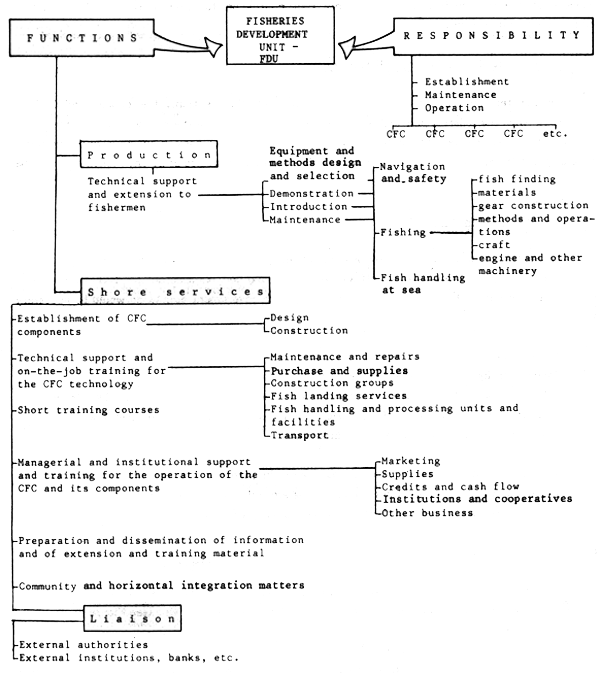FDU is a well integrated, multidisciplinary team of specialist technicians and general extensionists which can be regarded as a compact, localized extension service (see Figure 4).
FDU is in charge of supporting fishing communities and their CFCs in the establishment, maintenance and operation of new techniques and technologies on the one hand and new organizations and institutions on the other.
The activities of the FDU teams are expected to rely on the participation of fishing folk in the identification, planning, implementation and monitoring of their development programmes.

Figure 4 Fisheries Development Unit - FDU - its functions and responsibilities
FDU has the continuing responsibility for extending technical and organizational support and advice to the communities involved in the programme, and thus, enabling them to operate services and facilities of the CFC, and for training local workers and managers in their management, operation and maintenance with the aim of eventual self-reliance. Ideally, an FDU sooner or later will work itself out of its job.
To be effective, the FDU team must be able to gain the confidence of the local people. This requires the FDU members to be selected not only for their technical skills but also for their suitability to engage in long-term extension work, sometimes under difficult conditions in remote areas. Ambition for achievement is another important requirement. The right attitude and professional competence, rarely found in a single person, are both equally important.
The FDU team must be able to adopt a flexible approach in the execution of its working programme. Development is a continuous process of change. A failure or a success at an intermediate stage may call for actions and developments not envisaged in the original planning. The FDU team members must be able to recognise these situations, bring them up for discussion in the community concerned and assist the community in reacting appropriately. Such changes may also require the introduction, from time to time, of new expertise into the FDU.
The FDU should also provide liaison between the local communities and the government authorities and other agencies involved in the development programme. These will certainly include the national fisheries authorities, but may also include departments concerned with public health, education, public works and utilities, agriculture, and so on, as well as banks and various national and international organizations. In some cases, it may be appropriate to include specialists from such institutions and organizations as members on the FDU team.
A single FDU would serve several CFCs. It can best be located at one of the CFCs - the one which is readily accessible to all of them. Where large and important fishing communities are involved one FDU may be required to serve only one or two CFCs. In other cases, one FDU may have to service up to five or more communities and be able to do it quite successfully, all depending on the circumstances and on the quality and strength of the FDU team.
Whenever possible, each FDU should be a self-contained unit with its own transport, equipment and operating budget. An FDU must be highly self-sufficient, prepared and able to operate in isolation and able to provide “on call” assistance. It ought to be a decentralised arm of the responsible fisheries authorities (national, or provincial, etc.), executing their policies under their audit. Within its broad terms of reference, however, the FDU should have the authority to make decisions and take necessary actions without referring to higher authority. Consequently, an FDU would have a full but accountable control over spending its own budget, including, within limits, the shifting of expenditures from one budget item to another. It should be emphasized that even the best staffed and equipped FDU would be ineffective if it is not delegated with the appropriate logistic, financial and administrative authority. Since most CFC/FDU projects would be aimed at rural areas, frequently remote from national and provincial administrative centres, such decentralisation on the part of both the government and any technical assistance agencies involved, should be considered one of the main conditions for launching the programme.
With the changes occurring in a fishing community comes the necessity to train its members in skills and activities not practised before. The FDU should be responsible for either providing the necessary training directly, or for assisting the community members to obtain such training elsewhere through arranging for them external scholarships, apprenticeships, etc.
The direct training would mainly be given on the job. It would be provided at three levels:
to fishermen, fish processors, service personnel;
to managers/operators of facilities and services in both technical skills and business management;
to national and local counterparts and staff of the FDU (where it is operated with expatriate assistance) who would eventually take over its operation.
The on-the-job training may, where necessary, be supported by short courses, locally organized by the FDU. The subjects of such courses could include such things as:
outboard motor and inboard diesel engine maintenance;
means and techniques against post-harvest losses;
accounting and small-business management, etc.
The FDU can be instrumental also in promoting more general training and education in the fields of general literacy, health, and community and civic life.